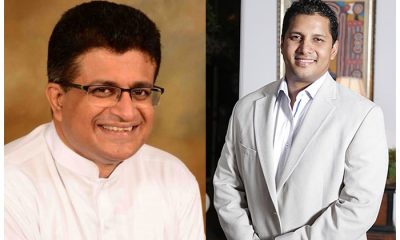Opinion
Jerome Fernando and his profane gimmicks – II
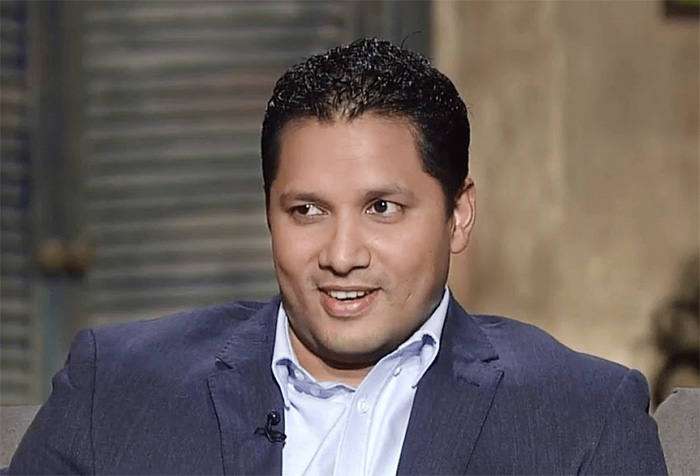
By Rohana R. Wasala
(Continued from yesterday May 24, 2023)
Some well-meaning, erudite, but very naive and innocent, young bhikkhus are challenging Paster Jerome Fernando to a debate over his deprecatory remarks about Buddhism; that, I think, is ridiculously ingenuous and unnecessary, because that is giving that man a measure of dignity that he doesn’t deserve, and also because he cannot be credited with a decent understanding even of Christianity, let alone anything additional outside that domain. These young monks are being eclipsed in their calm but determined attempt to react to Jerome’s disinformation and deception without any ill will. By whom? They are getting overshadowed by a few yellow-robed imposters who are themselves Buddhist versions of pastor Jerome Fernando. Actually, those few false monks and the fake prophet are birds of a feather probably fed by the same hands, as some say.
It has also been observed that certain discredited politicians are exploiting the opportunity that came their way through this obviously well-rehearsed Jerome Fernando episode to take a dig at each other for the heck of it, without utilising it to repair the damage it is causing to reconciliation. Last but not least, where are the Ven Mahanayake theras? Their silence in crisis situations has often aggravated issues affecting the Buddha Sasana. The online media I normally consult have nothing in this regard. However, one can’t blame the Ven Mahanayakes because they avoid politics, as they have done down the centuries. They used to advise the monarch only in spiritual matters, and the monarch took responsibility for looking after the Shashanaya. The most senior monk or monks, close to the royalty, offered their opinion in succession matters on rare occasions, and also when the ruler failed in his duties or when there were foreign threats to the nation. The Sangha never took part in ruling, but remained above the ruler. The Buddhist Sangha is a very democratic community, where one monk has no control over another. Times have changed. It is urgent that the Mahanayakes do more to save the Buddha Shasanaya including the Fourfold Assembly of Followers (Sivvanak Pirisa) of male and female lay Buddhists and bhikkhus and bhikshunis.
Back to the topic. Meanwhile, a complaint was lodged with the Criminal Investigation Department (CID) by the propaganda secretary of the political party, Pivituru Hela Urumaya (PHU), Iranga Vidvath Mendis, in connection with the relevant offensive statements made by Jerome Fernando who calls himself a prophet, which are derogatory to the Buddha, Buddhism, and other religions. This is the only meaningful reaction I have seen so far to Jerome Fernando’s outrage (up to the time of writing). The complainant demands that the law be applied to the (suspect) offender in this case in terms of the International Covenant on Civil and Political Rights (ICCPR) Act No. 56 of 2007.
The aforementioned petition to the CID was published in a news report in the online lanka c news. It quoted the following fromJerome Fernando’s importunate harangue:
“This is what separates Christianity from Buddhism. Because for a Buddhist in their mind, it’s like, okay, අනුන්ට කලදේ තමන්ට පලදේ in a sense, it’s true, especially if you do something to a prophet. Anyways. Now, but in the Buddhist mind, they never hear the love of Buddha. Are you hearing this? Their focus is enlightenment. But to be enlightened, you need light. The Buddha himself, the name Buddha means enlightened one. Ladies and gentlemen, what is greater, light or enlightened? Jesus said, I’m the light of the world. so i tell you now, jesus didn’t said I’m the enlightened one, No, no, no, no. Jesus came from a different wavelength. Jesus said I’m the light. So, I submit to you, the Buddha was looking for light. He was actually looking for Jesus. This is why every Buddhist needs Jesus.”
I came across a YouTube video clip of the relevant part of Jerome Fernando’s coercive religious rant against the Buddha, Buddhism and Buddhists that contained more. There was a singing part to it too, that ridicules such traditional curative and protective magical remedies as tying charmed threads, anointing charmed oil, etc., usually found among rural folk, as superstitious practices based on Buddhist teachings. Those are cultural things and should not be confused with Buddhism. Buddha did not advocate such things. He himself visited a physician called Jeevaka when he fell ill, according to the known life of the Buddha. He preached no religion, and never prescribed blind-faith based devotional practices or mindless rituals. Even the most ignorant Buddhists know that magical cures like charmed threads, oils, and chants are not part of the doctrine they actually follow. Instead, those ritual performances are part and parcel of the established holistic native healing culture which maintains the vital balance between the physical and mental aspects of the patients’ health. These ancient healing arts have survived, particularly among villagers, into modern times. Jerome also staged some faith healing episodes, not different from them. Such magical fake cures are daily performed in many hundreds of devales dedicated to local deities found across the country which are patronised not only by gullible villagers, but by superstitious city dwellers including politicians and businessmen among others of the same ilk seeking divine assistance with their nefarious projects. Why should a ‘prophet’ demean his god by descending to the level of a village kapurala unless he was a genuine fake?
In the letter to the CID referred to above, Mendis has left out (probably, as irrelevant to the point of his plaint) Fernando’s disparaging references to Hinduism and Islam and relevant sacred figures, which are equally outrageous, such as that Hindus venerate animals. A common allegation he raised against the leaders of all three non-Christian religions did not preach Love! But this fake prophet’s real target is the Buddha, his teaching and the Buddhists, his followers, whom he demeans, by implication, as a spiritually misguided lot. Though it is evident that Jerome is proficient enough in Sinhala for preaching to them, he speaks only in English and has himself interpreted in Sinhala. That, I think, is just an act he puts on to further impress his apparently mesmerised audience, whose awed gazes were fixed on his constantly beaming beatific smile.
What is Jerome Fernando saying in the snatch of speech quoted above? Simply, nonsense. He appears to be ignorant of his own religion of Christianity and its truly great founder Jesus Christ. Christianity came five or six hundred years after Buddhism. The latter is definitely beyond pastor Fernando’s power of understanding. What did Buddhists do to him (if he means himself by ‘prophet’) for him to say “anunta kala de tamanta pala de” (which would be equivalent to the English proverb ‘Curses come home to roost’)? (When he said this, though, he seemed to be mocking his own ‘prophet’ act!) This idea of ‘retaliatory justice’ is not part of the Buddhist concept of karmic causation. People from different cultural backgrounds accept the idea that bad deeds earn you bad results and that good deeds bring you good results, as a self-evident truth. The Karma concept taught in Buddhism is much more profound and complex than ‘Curses come home to roost’.
A word about the idea of love that Jerome finds missing in Buddhism. Buddhism is nothing if it is not about wisdom and compassion. The Buddha does uphold love as a positive emotion, but says that it is ultimately based on selfishness/the illusion of ‘self’. The Buddha’s teaching recognises a difference between love (that you feel for a person) and unconditional universal compassion or loving-kindness (maitri, friendliness) towards all sentient beings, something that is completely selfless. I think Christian love is also very close to or identical with the Buddhist concept of loving-kindness. To me it looks like the highly intelligent Jerome Fernando has not so far cared to grasp at least a faint idea of the Buddha’s profound dhamma. He has no sense of history, for he doesn’t know that the Buddha lived five to six centuries before Jesus was born. Otherwise, if he is in his right senses at least temporarily, how can he say that the Buddha was looking for Jesus? What do you know about the Enlightenment concept taught in Buddhism, Jerome? Obviously, NOTHING! You equate enlightenment to lighting up or illuminating something. That is stupid. An Australian YouTuber of Sri Lankan origin says that he had some slight acquaintance with Jerome as a young Burgher with a different name doing modelling work for commercial firms about twenty years back. It’s plausible information. He uses both Sinhala and English equally fluently. Oops! I almost forgot. At the end or thereabouts of his Buddha bashing, quite paradoxically, like a true Christian preacher or a genuine Buddhist monk for that matter, he admonishes his congregation: “Never persecute anybody, never shame another person’s faith”.
I will wind up with a reference to the Buddha’s famous Kalama Sutta discourse. The Buddha advised his disciples to question and examine even the Tathagata (Buddha) himself to find the trustworthiness, the authenticity, of the teacher they chose to follow. A group of young men called the Kalamas came to the Buddha with a question. They wanted to learn from him how they could separate truths from falsehoods uttered by the various venerable recluses and brahmanas who visited their village of Kesaputta from time to time and preached their different doctrines that disagreed with each other. Obviously, the young men had heard of the fame of the Buddha who himself had studied under the most famous teachers of the time and exhaustively analysed their teachings, and dissatisfied, had embarked on his own long and assiduous search for the Truth and eventually attained Enlightenment. The Buddha’s advice to them was: “Kalamas, do not be led by reports, or tradition, or hearsay. Be not led by the authority of religious texts, nor by mere logic and inference, nor by considering appearances, nor by the delight in speculative opinions, nor by seeming possibilities, nor by the idea: ‘this is our teacher’. But…when you know for yourselves that certain things are unwholesome (akusala), and wrong, and bad, then give them up… and when you know for yourselves that certain things are wholesome (kusala) and good, then accept them and follow them”. (I am quoting here from Ven Walpola Rahula thera’s classic dhamma compendium ‘What the Buddha Taught’ first published in London in 1959, and reprinted many times since, which Jerome Fernando may profitably read and still remain, or learn to be, a pious and virtuous Christian, which, I am afraid, he is not at present.)
I can easily answer your criticisms of Hinduism and Islam, but it is better for you to learn by yourself their moral essence that is as noble and as ennobling as Christianity.
(Concluded)
Opinion
Child food poverty: A prowling menace
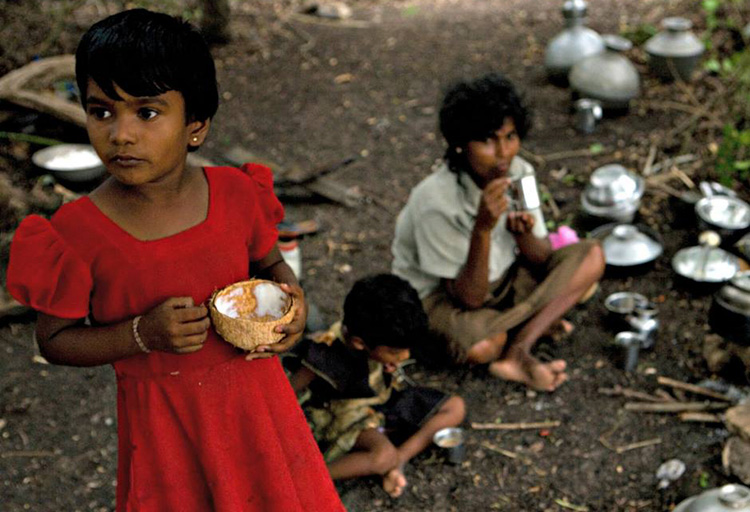
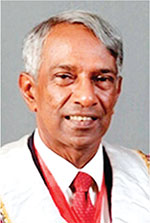 by Dr B.J.C.Perera
by Dr B.J.C.Perera
MBBS(Cey), DCH(Cey), DCH(Eng), MD(Paed), MRCP(UK), FRCP(Edin),
FRCP(Lon), FRCPCH(UK), FSLCPaed, FCCP, Hony FRCPCH(UK), Hony. FCGP(SL)
Specialist Consultant Paediatrician and Honorary Senior Fellow,
Postgraduate Institute of Medicine, University of Colombo, Sri Lanka.
Joint Editor, Sri Lanka Journal of Child Health
In an age of unprecedented global development, technological advancements, universal connectivity, and improvements in living standards in many areas of the world, it is a very dark irony that child food poverty remains a pressing issue. UNICEF defines child food poverty as children’s inability to access and consume a nutritious and diverse diet in early childhood. Despite the planet Earth’s undisputed capacity to produce enough food to nourish everyone, millions of children still go hungry each day. We desperately need to explore the multifaceted deleterious effects of child food poverty, on physical health, cognitive development, emotional well-being, and societal impacts and then try to formulate a road map to alleviate its deleterious effects.
Every day, right across the world, millions of parents and families are struggling to provide nutritious and diverse foods that young children desperately need to reach their full potential. Growing inequities, conflict, and climate crises, combined with rising food prices, the overabundance of unhealthy foods, harmful food marketing strategies and poor child-feeding practices, are condemning millions of children to child food poverty.
In a communique dated 06th June 2024, UNICEF reports that globally, 1 in 4 children; approximately 181 million under the age of five, live in severe child food poverty, defined as consuming at most, two of eight food groups in early childhood. These children are up to 50 per cent more likely to suffer from life-threatening malnutrition. Child Food Poverty: Nutrition Deprivation in Early Childhood – the third issue of UNICEF’s flagship Child Nutrition Report – highlights that millions of young children are unable to access and consume the nutritious and diverse diets that are essential for their growth and development in early childhood and beyond.
It is highlighted in the report that four out of five children experiencing severe child food poverty are fed only breastmilk or just some other milk and/or a starchy staple, such as maize, rice or wheat. Less than 10 per cent of these children are fed fruits and vegetables and less than 5 per cent are fed nutrient-dense foods such as eggs, fish, poultry, or meat. These are horrendous statistics that should pull at the heartstrings of the discerning populace of this world.
The report also identifies the drivers of child food poverty. Strikingly, though 46 per cent of all cases of severe child food poverty are among poor households where income poverty is likely to be a major driver, 54 per cent live in relatively wealthier households, among whom poor food environments and feeding practices are the main drivers of food poverty in early childhood.
One of the most immediate and visible effects of child food poverty is its detrimental impact on physical health. Malnutrition, which can result from both insufficient calorie intake and lack of essential nutrients, is a prevalent consequence. Chronic undernourishment during formative years leads to stunted growth, weakened immune systems, and increased susceptibility to infections and diseases. Children who do not receive adequate nutrition are more likely to suffer from conditions such as anaemia, rickets, and developmental delays.
Moreover, the lack of proper nutrition can have long-term health consequences. Malnourished children are at a higher risk of developing chronic illnesses such as heart disease, diabetes, and obesity later in life. The paradox of child food poverty is that it can lead to both undernutrition and overnutrition, with children in food-insecure households often consuming calorie-dense but nutrient-poor foods due to economic constraints. This dietary pattern increases the risk of obesity, creating a vicious cycle of poor health outcomes.
The impacts of child food poverty extend beyond physical health, severely affecting cognitive development and educational attainment. Adequate nutrition is crucial for brain development, particularly in the early years of life. Malnutrition can impair cognitive functions such as attention, memory, and problem-solving skills. Studies have consistently shown that malnourished children perform worse academically compared to their well-nourished peers. Inadequate nutrition during early childhood can lead to reduced school readiness and lower IQ scores. These children often struggle to concentrate in school, miss more days due to illness, and have lower overall academic performance. This educational disadvantage perpetuates the cycle of poverty, as lower educational attainment reduces future employment opportunities and earning potential.
The emotional and psychological effects of child food poverty are profound and are often overlooked. Food insecurity creates a constant state of stress and anxiety for both children and their families. The uncertainty of not knowing when or where the next meal will come from can lead to feelings of helplessness and despair. Children in food-insecure households are more likely to experience behavioural problems, including hyperactivity, aggression, and withdrawal. The stigma associated with poverty and hunger can further exacerbate these emotional challenges. Children who experience food poverty may feel shame and embarrassment, leading to social isolation and reduced self-esteem. This psychological toll can have lasting effects, contributing to mental health issues such as depression and anxiety in adolescence and adulthood.
Child food poverty also perpetuates cycles of poverty and inequality. Children who grow up in food-insecure households are more likely to remain in poverty as adults, continuing the intergenerational transmission of disadvantage. This cycle of poverty exacerbates social disparities, contributing to increased crime rates, reduced social cohesion, and greater reliance on social welfare programmes. The repercussions of child food poverty ripple through society, creating economic and social challenges that affect everyone. The healthcare costs associated with treating malnutrition-related illnesses and chronic diseases are substantial. Additionally, the educational deficits linked to child food poverty result in a less skilled workforce, which hampers economic growth and productivity.
Addressing child food poverty requires a multi-faceted approach that tackles both immediate needs and underlying causes. Policy interventions are crucial in ensuring that all children have access to adequate nutrition. This can include expanding social safety nets, such as food assistance programmes and school meal initiatives, as well as targeted manoeuvres to reach more vulnerable families. Ensuring that these programmes are adequately funded and effectively implemented is essential for their success.
In addition to direct food assistance, broader economic and social policies are needed to address the root causes of poverty. This includes efforts to increase household incomes through living wage policies, job training programs, and economic development initiatives. Supporting families with affordable childcare, healthcare, and housing can also alleviate some of the financial pressures that contribute to food insecurity.
Community-based initiatives play a vital role in combating child food poverty. Local food banks, community gardens, and nutrition education programmes can help provide immediate relief and promote long-term food security. Collaborative efforts between government, non-profits, and the private sector are necessary to create sustainable solutions.
Child food poverty is a profound and inescapable issue with far-reaching consequences. Its deleterious effects on physical health, cognitive development, emotional well-being, and societal stability underscore the urgent need for comprehensive action. As we strive for a more equitable and just world, addressing child food poverty must be a priority. By ensuring that all children have access to adequate nutrition, we can lay the foundation for a healthier, more prosperous future for individuals and society as a whole. The fight against child food poverty is not just a moral imperative but an investment in our collective future. Healthy, well-nourished children are more likely to grow into productive, contributing members of society. The benefits of addressing this issue extend beyond individual well-being, enhancing economic stability and social harmony. It is incumbent upon us all to recognize and act upon the understanding that every child deserves the right to adequate nutrition and the opportunity to thrive.
Despite all of these existent challenges, it is very definitely possible to end child food poverty. The world needs targeted interventions to transform food, health, and social protection systems, and also take steps to strengthen data systems to track progress in reducing child food poverty. All these manoeuvres must comprise a concerted effort towards making nutritious and diverse diets accessible and affordable to all. We need to call for child food poverty reduction to be recognized as a metric of success towards achieving global and national nutrition and development goals.
Material from UNICEF reports and AI assistance are acknowledged.
Opinion
Do opinion polls matter?
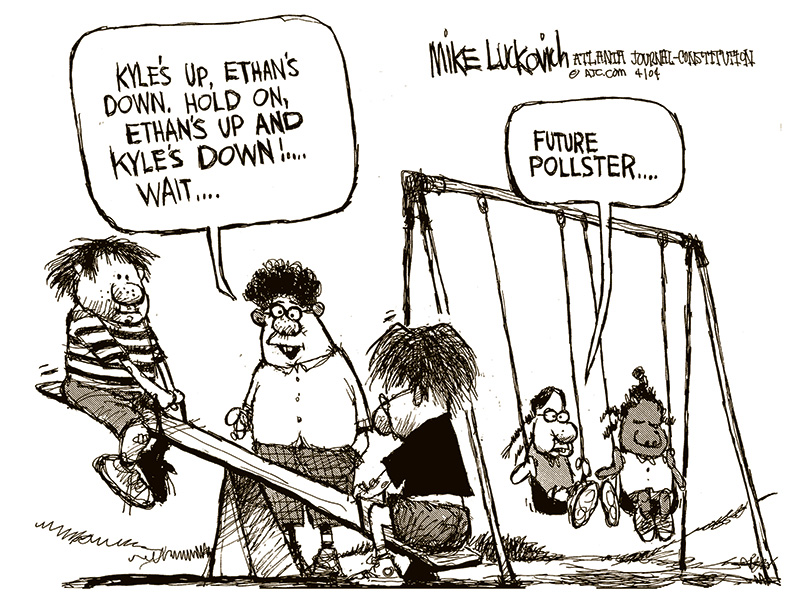
By Dr Upul Wijayawardhana
The colossal failure of not a single opinion poll predicting accurately the result of the Indian parliamentary election, the greatest exercise in democracy in the world, raises the question whether the importance of opinion polls is vastly exaggerated. During elections two types of opinion polls are conducted; one based on intentions to vote, published during or before the campaign, often being not very accurate as these are subject to many variables but exit polls, done after the voting where a sample tally of how the voters actually voted, are mostly accurate. However, of the 15 exit polls published soon after all the votes were cast in the massive Indian election, 13 vastly overpredicted the number of seats Modi’s BJP led coalition NDA would obtain, some giving a figure as high as 400, the number Modi claimed he is aiming for. The other two polls grossly underestimated predicting a hung parliament. The actual result is that NDA passed the threshold of 272 comfortably, there being no landslide. BJP by itself was not able to cross the threshold, a significant setback for an overconfident Mody! Whether this would result in less excesses on the part of Modi, like Muslim-bashing, remains to be seen. Anyway, the statement issued by BJP that they would be investigating the reasons for failure rather than blaming the process speaks very highly of the maturity of the democratic process in India.
I was intrigued by this failure of opinion polls as this differs dramatically from opinion polls in the UK. I never failed to watch ‘Election night specials’ on BBC; as the Big Ben strikes ‘ten’ (In the UK polls close at 10pm} the anchor comes out with “Exit polls predict that …” and the actual outcome is often almost as predicted. However, many a time opinion polls conducted during the campaign have got the predictions wrong. There are many explanations for this.
An opinion poll is defined as a research survey of public opinion from a particular sample, the origin of which can be traced back to the 1824 US presidential election, when two local newspapers in North Carolina and Delaware predicted the victory of Andrew Jackson but the sample was local. First national survey was done in 1916 by the magazine, Literary Digest, partly for circulation-raising, by mailing millions of postcards and counting the returns. Of course, this was not very scientific though it accurately predicted the election of Woodrow Wilson.
Since then, opinion polls have grown in extent and complexity with scientific methodology improving the outcome of predictions not only in elections but also in market research. As a result, some of these organisations have become big businesses. For instance, YouGov, an internet-based organisation co-founded by the Iraqi-born British politician Nadim Zahawi, based in London had a revenue of 258 million GBP in 2023.
In Sri Lanka, opinion polls seem to be conducted by only one organisation which, by itself, is a disadvantage, as pooled data from surveys conducted by many are more likely to reflect the true situation. Irrespective of the degree of accuracy, politicians seem to be dependent on the available data which lend explanations to the behaviour of some.
The Institute for Health Policy’s (IHP) Sri Lanka Opinion Tracker Survey has been tracking the voting intentions for the likely candidates for the Presidential election. At one stage the NPP/JVP leader AKD was getting a figure over 50%. This together with some degree of international acceptance made the JVP behave as if they are already in power, leading to some incidents where their true colour was showing.
The comments made by a prominent member of the JVP who claimed that the JVP killed only the riff-raff, raised many questions, in addition to being a total insult to many innocents killed by them including my uncle. Do they have the authority to do so? Do extra-judicial killings continue to be JVP policy? Do they consider anyone who disagrees with them riff-raff? Will they kill them simply because they do not comply like one of my admired teachers, Dr Gladys Jayawardena who was considered riff-raff because she, as the Chairman of the State Pharmaceutical Corporation, arranged to buy drugs cheaper from India? Is it not the height of hypocrisy that AKD is now boasting of his ties to India?
Another big-wig comes with the grand idea of devolving law and order to village level. As stated very strongly, in the editorial “Pledges and reality” (The Island, 20 May) is this what they intend to do: Have JVP kangaroo-courts!
Perhaps, as a result of these incidents AKD’s ratings has dropped to 39%, according to the IHP survey done in April, and Sajith Premadasa’s ratings have increased gradually to match that. Whilst they are level pegging Ranil is far behind at 13%. Is this the reason why Ranil is getting his acolytes to propagate the idea that the best for the country is to extend his tenure by a referendum? He forced the postponement of Local Governments elections by refusing to release funds but he cannot do so for the presidential election for constitutional reasons. He is now looking for loopholes. Has he considered the distinct possibility that the referendum to extend the life of the presidency and the parliament if lost, would double the expenditure?
Unfortunately, this has been an exercise in futility and it would not be surprising if the next survey shows Ranil’s chances dropping even further! Perhaps, the best option available to Ranil is to retire gracefully, taking credit for steadying the economy and saving the country from an anarchic invasion of the parliament, rather than to leave politics in disgrace by coming third in the presidential election. Unless, of course, he is convinced that opinion polls do not matter and what matters is the ballots in the box!
Opinion
Thoughtfulness or mindfulness?

By Prof. Kirthi Tennakone
ktenna@yahoo.co.uk
Thoughtfulness is the quality of being conscious of issues that arise and considering action while seeking explanations. It facilitates finding solutions to problems and judging experiences.
Almost all human accomplishments are consequences of thoughtfulness.
Can you perform day-to-day work efficiently and effectively without being thoughtful? Obviously, no. Are there any major advancements attained without thought and contemplation? Not a single example!
Science and technology, art, music and literary compositions and religion stand conspicuously as products of thought.
Thought could have sinister motives and the only way to eliminate them is through thought itself. Thought could distinguish right from wrong.
Empathy, love, amusement, and expression of sorrow are reflections of thought.
Thought relieves worries by understanding or taking decisive action.
Despite the universal virtue of thoughtfulness, some advocate an idea termed mindfulness, claiming the benefits of nurturing this quality to shape mental wellbeing. The concept is defined as focusing attention to the present moment without judgment. A way of forgetting the worries and calming the mind – a form of meditation. A definition coined in the West to decouple the concept from religion. The attitude could have a temporary advantage as a method of softening negative feelings such as sorrow and anger. However, no man or woman can afford to be non-judgmental all the time. It is incompatible with indispensable thoughtfulness! What is the advantage of diverting attention to one thing without discernment during a few tens of minute’s meditation? The instructors of mindfulness meditation tell you to focus attention on trivial things. Whereas in thoughtfulness, you concentrate the mind on challenging issues. Sometimes arriving at groundbreaking scientific discoveries, solution of mathematical problems or the creation of masterpieces in engineering, art, or literature.
The concept of meditation and mindfulness originated in ancient India around 1000 BCE. Vedic ascetics believed the practice would lead to supernatural powers enabling disclosure of the truth. Failing to meet the said aspiration, notwithstanding so many stories in scripture, is discernable. Otherwise, the world would have been awakened to advancement by ancient Indians before the Greeks. The latter culture emphasized thoughtfulness!
In India, Buddha was the first to deviate from the Vedic philosophy. His teachers, Alara Kalama and Uddaka Ramaputra, were adherents of meditation. Unconvinced of their approach, Buddha concluded a thoughtful analysis of the actualities of life should be the path to realisation. However, in an environment dominated by Vedic tradition, meditation residually persisted when Buddha’s teachings transformed into a religion.
In the early 1970s, a few in the West picked up meditation and mindfulness. We Easterners, who criticize Western ideas all the time, got exalted after seeing something Eastern accepted in the Western circles. Thereafter, Easterners took up the subject more seriously, in the spirit of its definition in the West.
Today, mindfulness has become a marketable commodity – a thriving business spreading worldwide, fueled largely by advertising. There are practice centres, lessons onsite and online, and apps for purchase. Articles written by gurus of the field appear on the web.
What attracts people to mindfulness programmes? Many assume them being stressed and depressed needs to improve their mental capacity. In most instances, these are minor complaints and for understandable reasons, they do not seek mainstream medical interventions but go for exaggeratedly advertised alternatives. Mainstream medical treatments are based on rigorous science and spell out both the pros and cons of the procedure, avoiding overstatement. Whereas the alternative sector makes unsubstantiated claims about the efficacy and effectiveness of the treatment.
Advocates of mindfulness claim the benefits of their prescriptions have been proven scientifically. There are reports (mostly in open-access journals which charge a fee for publication) indicating that authors have found positive aspects of mindfulness or identified reasons correlating the efficacy of such activities. However, they rarely meet standards normally required for unequivocal acceptance. The gold standard of scientific scrutiny is the statistically significant reproducibility of claims.
If a mindfulness guru claims his prescription of meditation cures hypertension, he must record the blood pressure of participants before and after completion of the activity and show the blood pressure of a large percentage has stably dropped and repeat the experiment with different clients. He must also conduct sessions where he adopts another prescription (a placebo) under the same conditions and compares the results. This is not enough, he must request someone else to conduct sessions following his prescription, to rule out the influence of the personality of the instructor.
The laity unaware of the above rigid requirements, accede to purported claims of mindfulness proponents.
A few years ago, an article published and widely cited stated that the practice of mindfulness increases the gray matter density of the brain. A more recent study found there is no such correlation. Popular expositions on the subject do not refer to the latter report. Most mindfulness research published seems to have been conducted intending to prove the benefits of the practice. The hard science demands doing the opposite as well-experiments carried out intending to disprove the claims. You need to be skeptical until things are firmly established.
Despite many efforts diverted to disprove Einstein’s General Theory of Relativity, no contradictions have been found in vain to date, strengthening the validity of the theory. Regarding mindfulness, as it stands, benefits can neither be proved nor disproved, to the gold standard of scientific scrutiny.
Some schools in foreign lands have accommodated mindfulness training programs hoping to develop the mental facility of students and Sri Lanka plans to follow. However, studies also reveal these exercises are ineffective or do more harm than good. Have we investigated this issue before imitation?
Should we force our children to focus attention on one single goal without judgment, even for a moment?
Why not allow young minds to roam wild in their deepest imagination and build castles in the air and encourage them to turn these fantasies into realities by nurturing their thoughtfulness?
Be more thoughtful than mindful?






